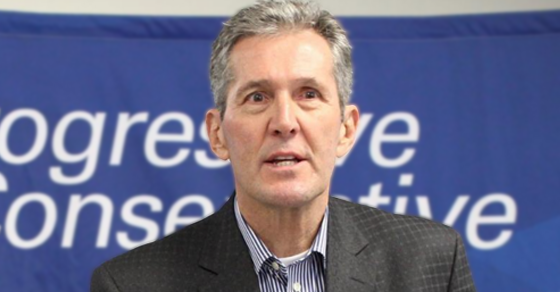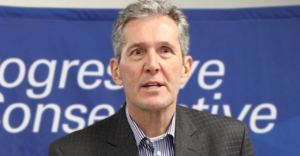
Manitoba PC leader Brian Pallister once argued same sex marriage would be bad for “diversity”
Brian Pallister has some pretty strange ideas about "diversity" and "discrimination."
Manitoba PC leader Brian Pallister has shared some pretty strange ideas about “diversity” and “discrimination.”
Pallister raised eyebrows Wednesday after he rejected the idea of tapping a cabinet minister to take charge on LGBTTQ issues because he thinks the idea is “not helpful.”
Of course, the gaffe-prone Tory leader has a well-documented history of opposing issues that impact the LGBTTQ community, but what’s also noteworthy is the bizarre logic he’s used to arrive at those conclusions.
In 2005, Pallister told the Winnipeg Free Press he opposed same sex marriage because allowing same sex couples to get married like everybody else was at odds with Canadian values – namely, “diversity”:
“Canada is strengthened by its diversity. Accepting our differences shows the world the true nature of our tolerance. This legislation is a symbolic gesture of tolerance. The question is, does changing the word ‘marriage’ to describe same-sex unions really show tolerance? I believe that it may just deny diversity.”
Pallister’s logic sort of had a point – a double-standard is not one but two standards, so technically that’s a diversity of standards.
Others would call that “discrimination” rather than “diversity,” but don’t worry: on that point, Pallister had something to say too.
Debating same sex marriage legislation in the House of Commons in 2005, Pallister argued that the Charter of Rights and Freedoms is, itself, “a discriminatory document in the sense that it chooses certain rights and freedoms for which it stands and it chooses others for which it does not.”
To really underline his thoughts on discrimination, Pallister would go on to compare the issue to “chess”:
“Let me talk about chess for a second. Someone claims chess is discriminatory because the pieces move differently. This is a clear case of unequal rights. This is a clear case of discrimination.”
Pallister would also compare his opposition to same sex marriage in terms of parenting his own children, explaining “we treat our children differently and unequally” and so “we discriminate against them” too.
Because according to his logic, what’s “good” for the Pallister children is “true” for adults who happen to be gay or lesbian, as well:
“We discriminate for the good of our children, for ourselves and our family. That is true with this issue as well.”
Which gets to the heart of the matter, as far as Pallister was concerned:
“The question is not whether we discriminate. Of course we all do, and both of them do. The question is whether that discrimination is justified or not.”
And as Pallister explained, on the issue of same sex marriage, discrimination was justified:
“By making heterosexuality optional rather than axiomatic, the bill would disconnect marriage from procreation … Society is not bound to treat all relationships equally. We should regard all persons as equal, but we should not regard all sexual or social activity as equal. This is why marriage has been endorsed as an institution in the past throughout the world because it cultivates the necessary conditions for human flourishing.”
At another point in the debate, Pallister referred to same sex marriage as a “social experiment” that “has been rejected virtually everywhere else in the world where it has been under consideration.”
Today, 22 countries around the world have legalized same sex marriages.
Pallister now says his position on the issue has “evolved,” although he points out he wasn’t alone in opposing same sex marriage at the time.
It’s not clear his views on “diversity” and “discrimination” were ever widely-shared opinions, however.
Photo: Facebook.
Our journalism is powered by readers like you.
We’re an award-winning non-profit news organization that covers topics like social and economic inequality, big business and labour, and right-wing extremism.
Help us build so we can bring to light stories that don’t get the attention they deserve from Canada’s big corporate media outlets.
Donate




